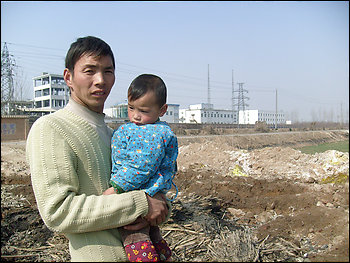China’s Solar Industry: The Dirty Side Of A “Green” Industry
Posted by keith on March 24th, 2008
Few people will be surprised at the revelations of a recent Washington Post article which highlighted the toxic waste being dumped by the manufacturers of solar photovoltaic panels and films into the waterways, soils and other ecosystems of China. The demand for Solar PV largely comes off the back of businesses that want to greenwash their way into our consciences by slapping an acre of solar panels on the roof of their headquarters, knowing full well that solar PV is totally inadequate for powering large-scale offices, data centres and industry. Few of these businesses consider the real benefits to be had from reducing their energy consumption in the first place: after all, governments and corporations say the economy has to keep growing, don’t they?
But at what cost? One cost is the massive offshoring of manufacturing to places where environmental and human working conditions are, quite frankly, atrocious. This is solely to gain the most product for the least cost. Compact fluorescent lamps are another area where a similar trend is being seen (and which I may cover in a different article). In principle, the use of CFLs is a good thing, but again, at what cost? It doesn’t have to be that way.
The Worldwatch institute have this to say about the despoilation of China’s environment:
“Technologies exist to recycle the chemical byproducts of solar-cell production, but some Chinese polysilicon plants, including Luoyang Zhonggui, are cutting costs and corners by avoiding significant extra investment in pollution control. The cheaper prices of their products, which do not currently factor in environmental costs, are projected to fan the rapid expansion of Chinese-made solar PV systems around the world, especially in industrial countries that can afford the still-expensive units.
“Although China will eventually benefit from this green technology as well as costs decline further, for the time being the industry continues to tread the traditional path of ‘pollute first, clean up afterwards.’ At stake are the underrepresented groups in Chinese society, especially rural farmers who depend on increasingly polluted lands for a living. China’s shining solar industry, while enabling blue skies elsewhere, is leaving behind a scarred landscape at home.”
The shift of manufacturing towards the production of goods that are environmentally “neutral” (i.e. they actively reduce the pollution / emissions that would otherwise be generated) would be a good thing if that manufacturing was not simply in addition to producing all of the other needless goods we voraciously consume. Sadly, not only is this manufacturing in addition, but it is being carried out at considerable environmental expense. This cannot be accepted: a “green” product is not green just because of what it says on the box. There needs to be a genuine cultural shift.





